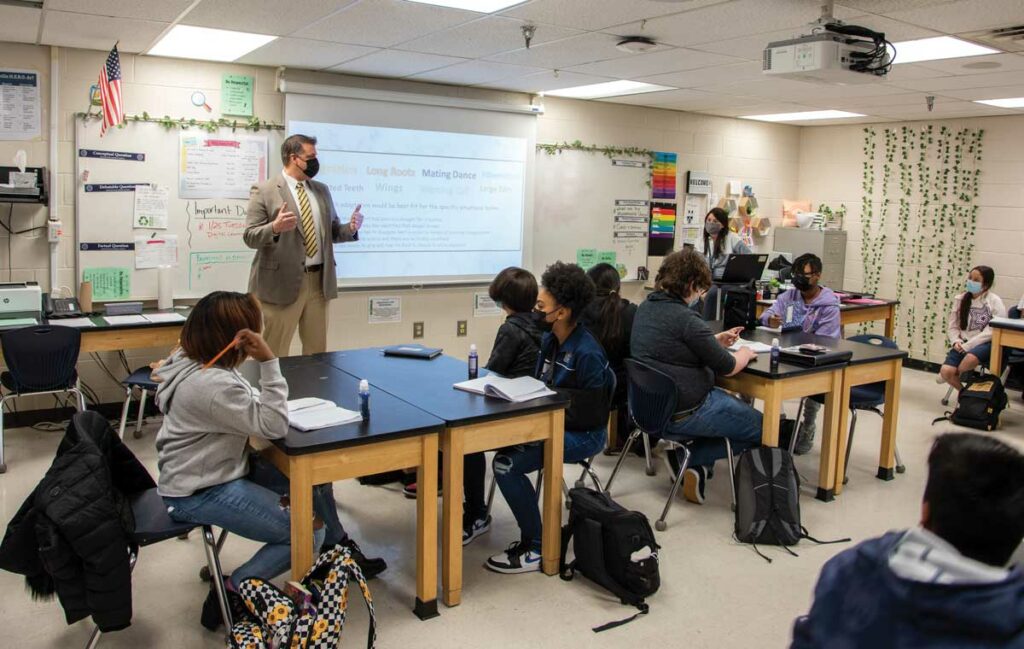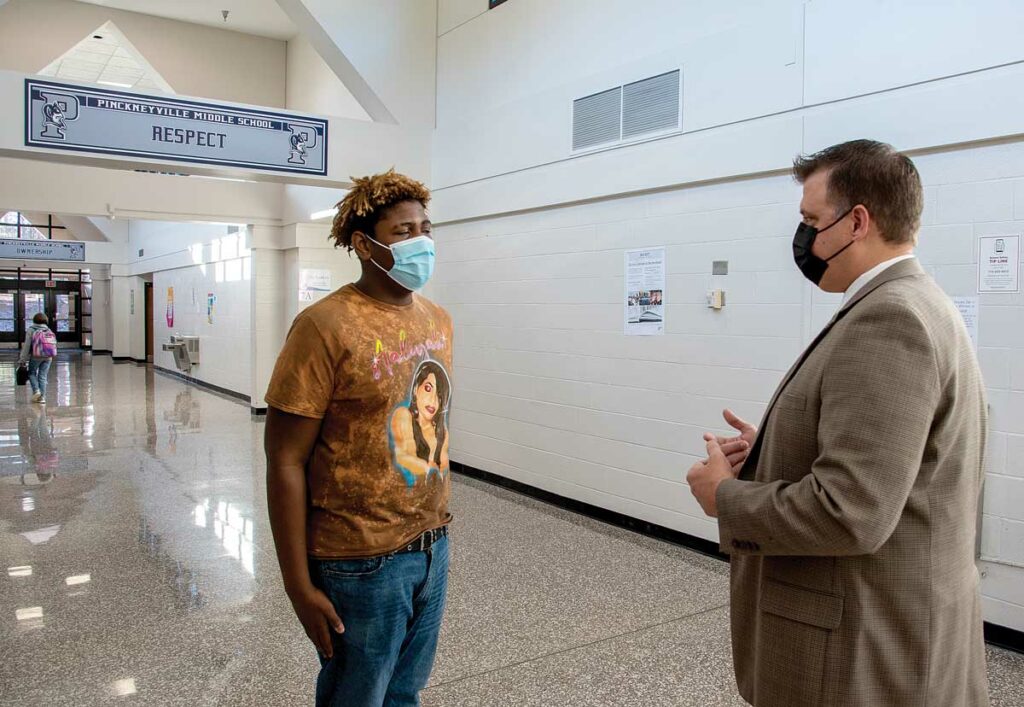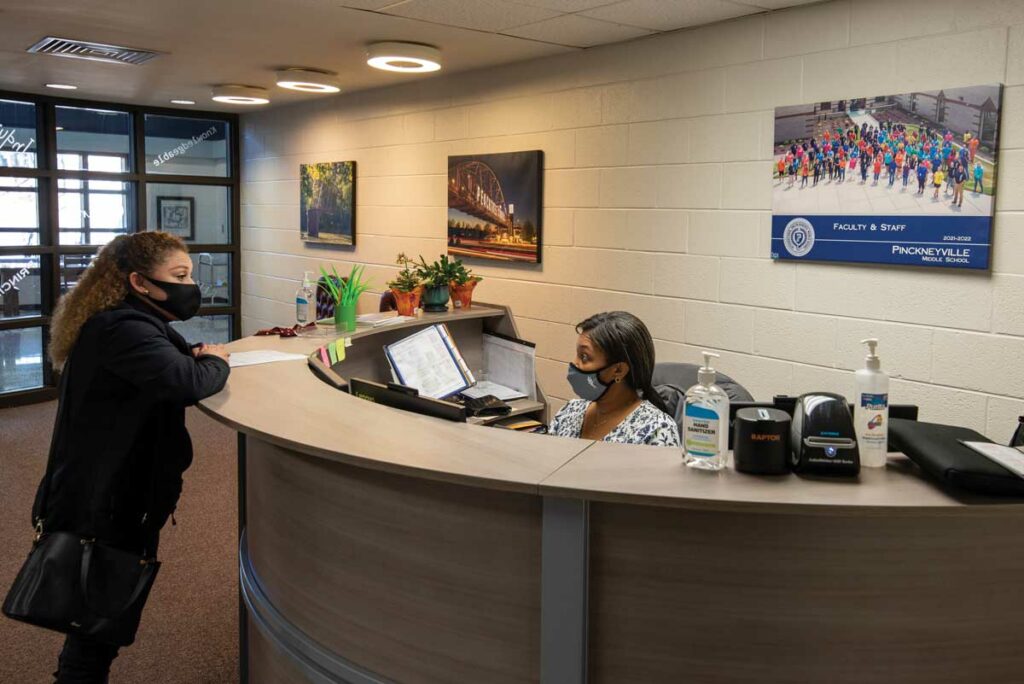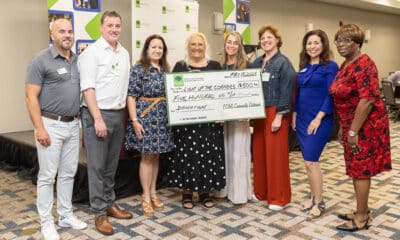Education
With School Enrollment Deadlines Looming, Middle School Choice May Be Toughest
Published
3 years agoon
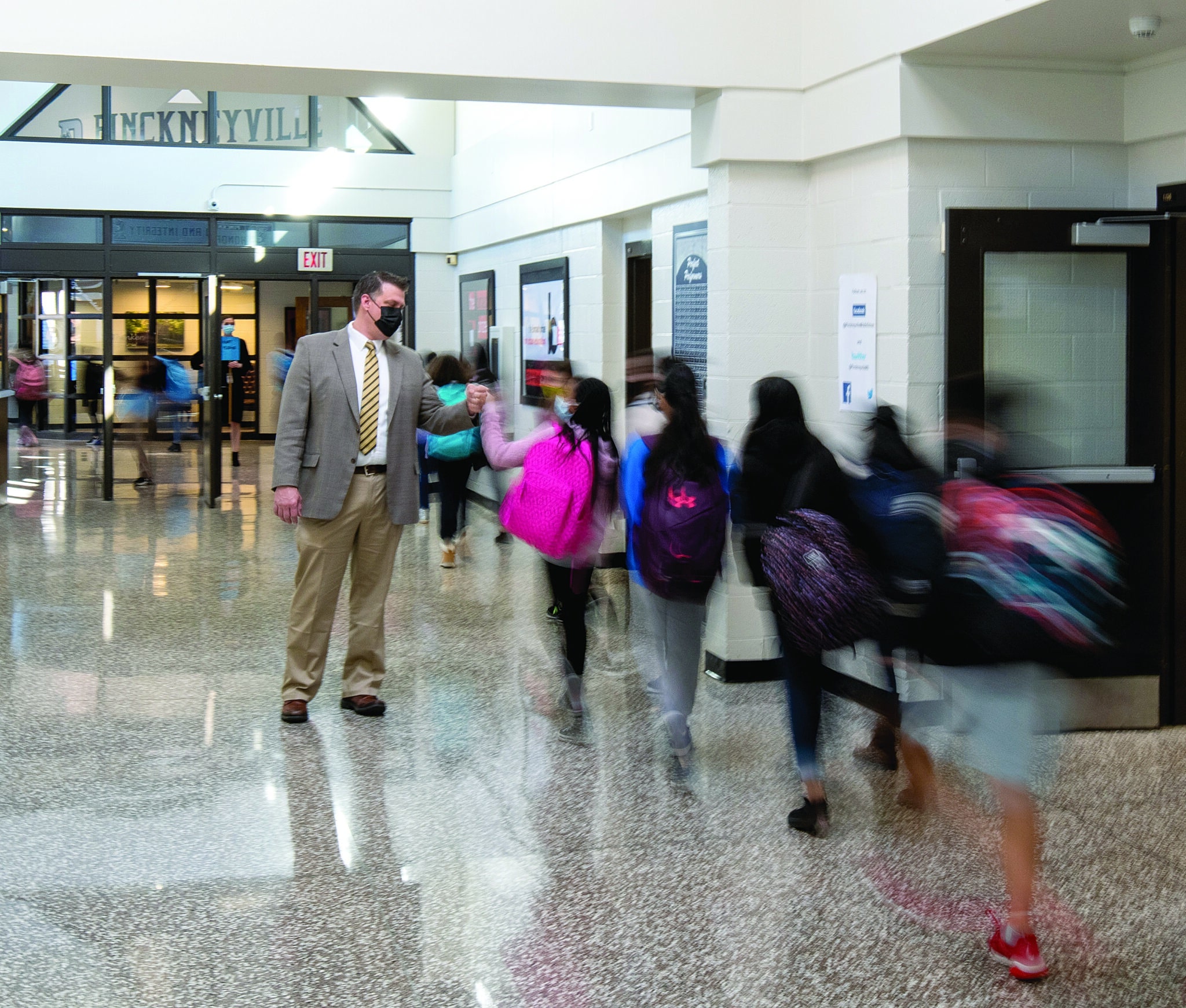
Although the second half of the school year has just gotten underway, it’s time for many parents and students to consider the transition from elementary school to middle school. It’s certainly not the only shift students make in their academic life, but it’s probably the most dramatic, most challenging and many say the most important.
During this time when children are going through physical, emotional and social changes, they are uprooted from a familiar setting and a routine that many have known for several years. Changing classes during the day, taking a different bus to school and often having to change out for gym class can be traumatic for even the most well-balanced individuals.
That doesn’t mean that it must be a scary experience.
Peachtree Corners has a hidden gem of sorts with Pinckneyville Middle School. Principal Todd Marschke is not only a long-time Gwinnett County Public Schools administrator, he lives in the neighborhood and his children have attended, currently attend or will attend the school.
“My own daughter went here my first year as principal,” Marschke said. “I have a son who attends now and another one who will be here soon. But all the students are my kids and I want the best education possible for all of them.”
Marschke is a product of Gwinnett County Public Schools where he attended Head Elementary, Shiloh Middle School, and graduated from Shiloh High School. He is also a graduate of Georgia State University. His teaching career started as a middle school gifted math and science teacher at Alton C. Crews Middle School. Marschke transitioned from Crews Middle School to Lanier Middle School for his first administrative position. For seven years, he served as principal in the Norcross cluster at GIVE Center West before coming to Pinckneyville in 2018.
Principal Todd Marschke asks a Home Room what they think about eating in the classroom. (Photos by Richard Phillips) Tremendous respect between Todd and one of his students, Julian. Principal Todd Marschke Working to resolve an issue with a student’s parent.
Good relationships
In his many years of educating youngsters, he’s realized that it boils down to strong, healthy relationships.
“It all starts with relationships – with all the staff, with the students, with the parents,” he said. “If you leave yourself open to develop those trusting, nurturing relationships, you can do great things.”
It’s that kind of focus and dedication that drew PTSA mom Shana Cooper to the school. She currently has an 11-year-old daughter and a 13-year-old son who attend Pinckneyville. She said right from the start Marschke made her feel welcome and showed that he’s an open, honest and reliable leader.
She cited an example of the TikTok craze where kids were encouraged to pull off pranks at school, such as clogging toilets with paper towels, slapping teachers on the behind, stealing school equipment and other forms of mischief.
“At a general meeting back in November he was just kind of talking about the upcoming year. … New students and parents were coming by and asking if it’s a dangerous school or a bad school,” she said.
Marschke asked parents not to confuse Pinckneyville issues with middle school issues. Every time kids make transitions they are exposed to new situations. For example, there is a lot more freedom and lot more kids in middle school than in elementary school.
Add to that COVID protocols and bouncing from in-person to virtual learning, and Marschke had a lot to deal with. The Tik Tok “devious lick” had to be dealt with swiftly and efficiently.
“The poor man has about 1,300 to 1,400 students at that school. And he’s got to basically parent and direct everyone through all of this COVID and Tik Tok, and just regular middle school craziness. And he does it with such a good outlook and such grace and positivity,” Cooper said.
“They isolated the situation [with the TikTok incidents] and figured out what kids are involved. They had the disciplinary action for them. And then they do a school wide announcement and usually an email,” Cooper added.
Marschke explained that it may seem cool to post hijinks on social media, but a lot of those situations can lead to bigger consequences like expulsion and trouble with the police. Fortunately, the Pinckneyville students got the message and the reign of capers was short-lived.
Great results
But Marschke likes to focus on the things that make his school shine.
As one of the few International Baccalaureate schools in the system, it has a high focus on academic excellence for all students.
“When you have high expectations, you help bring about high results,” he said.
Pinckneyville Middle School placed in the top 30% of all schools in Georgia for overall test scores (math proficiency is top 50%, and reading proficiency is top 30%) for the 2018-19 school year, according to Public School Review, a non-profit that provides free, detailed profiles of USA public schools and their surrounding communities.
It added that the percentage of students achieving proficiency in math is 49% (which is higher than the Georgia state average of 44%) for the 2018-19 school year. The percentage of students achieving proficiency in reading/language arts is 55% (which is higher than the Georgia state average of 45%) for the 2018-19 school year.
And as one of the most diverse schools in metro Atlanta, the administration makes extra efforts to showcase the various cultures and ethnicities. Black History Month, Hispanic Heritage Month, International Night and many special celebrations in between foster an atmosphere of inclusion.
“I encourage anyone who wants to know more about Pinckneyville Middle School to come for a visit, attend an open house and/or call me directly,” said Marschke. “We have a lot to offer, and I believe every student can thrive here.”
Related
Arlinda Smith Broady is part of the Boomerang Generation of Blacks that moved back to the South after their ancestors moved North. With approximately three decades of journalism experience (she doesn't look it), she's worked in tiny, minority-based newsrooms to major metropolitans. At every endeavor she brings professionalism, passion, pluck, and the desire to spread the news to the people.

Education
Celebration and Community: ICAGeorgia Wraps Up School Year with Two Festive Events
Published
1 week agoon
May 22, 2025
The International Charter Academy of Georgia (ICAGeorgia) recently hosted its third annual Dining with the Scholars event on April 18 — an evening filled with celebration, culture and community spirit.
Held at Canton House in Duluth, the event welcomed over 200 attendees, including students, parents, teachers, board members, local sponsors and special guest, the Consul General of Japan.
Fundraising and performances
The purpose of the event was twofold: to raise funds in support of academic programs for the school and, most importantly, to honor and showcase the outstanding talents and achievements of ICAGeorgia students.

Throughout the evening, guests enjoyed a silent auction, dinner and dessert, as well as a vibrant lineup of student performances, a magic show and live music — creating a truly festive and memorable atmosphere.
“We extend our heartfelt thanks to the many local companies and organizations whose generous sponsorship made this event possible,” said Felecia Tucker-Jones, principal of ICAGeorgia. “[The] support helps us continue to grow and enhance our academic offerings.”


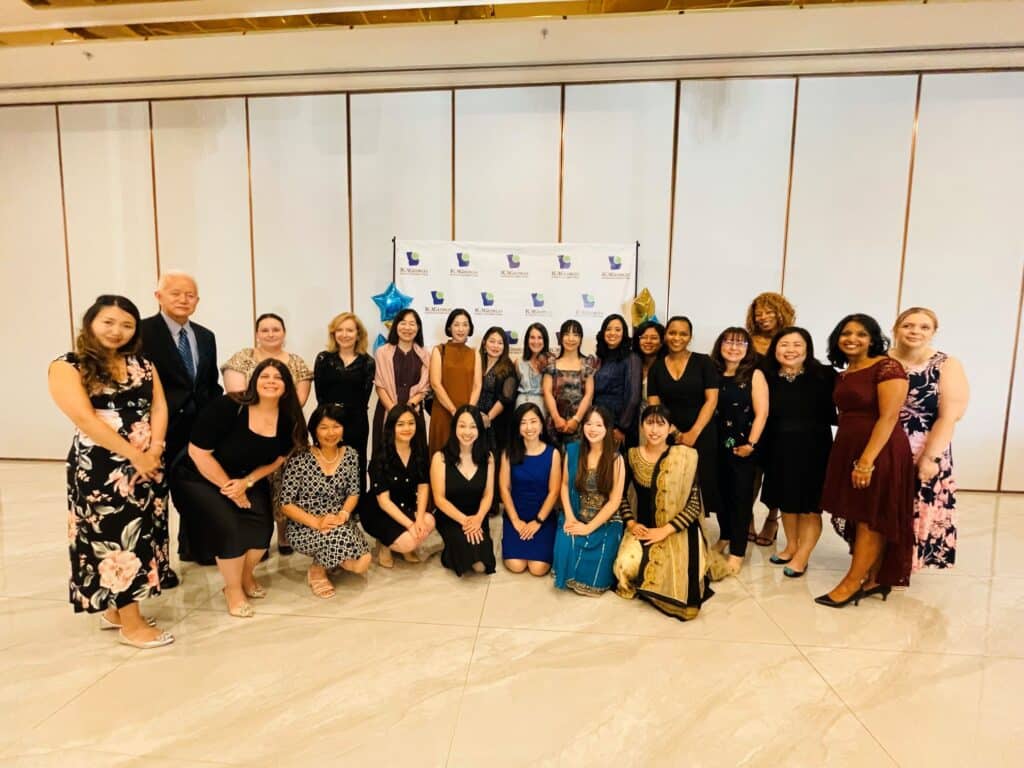

By all accounts, it was a night to remember — and a wonderful reminder of the strong, supportive community that surrounds the school.
Children’s Day Festival
On May 4, students, families and community members gathered at Thrasher Park in Norcross for a vibrant celebration of Children’s Day, a beloved Japanese holiday that honors children’s happiness, growth and well-being.

The Japan’s Children’s Day Festival 2025 brought together over 1,000 attendees for a full day of music, crafts, food and cultural experiences.
Visitors of all ages enjoyed traditional Japanese activities such as origami, kingyo sukui (goldfish scooping) and kimono try-ons, while kids played in bounce houses, participated in golf and soccer games and listened to story time in the park.
The festival’s stage was alive with performances from school choirs, dance studios and even a thrilling showcase of breakdancing and karate. Local vendors offered delicious international food — from pizza, tacos and paella to boba and shaved ice — while guests explored artisan booths and even online shopping options.
Culture and community
This festival was a beautiful reflection of cultural pride and community spirit and partnerships, with ICAGeorgia, local small businesses and generous sponsors bringing the vision to life.
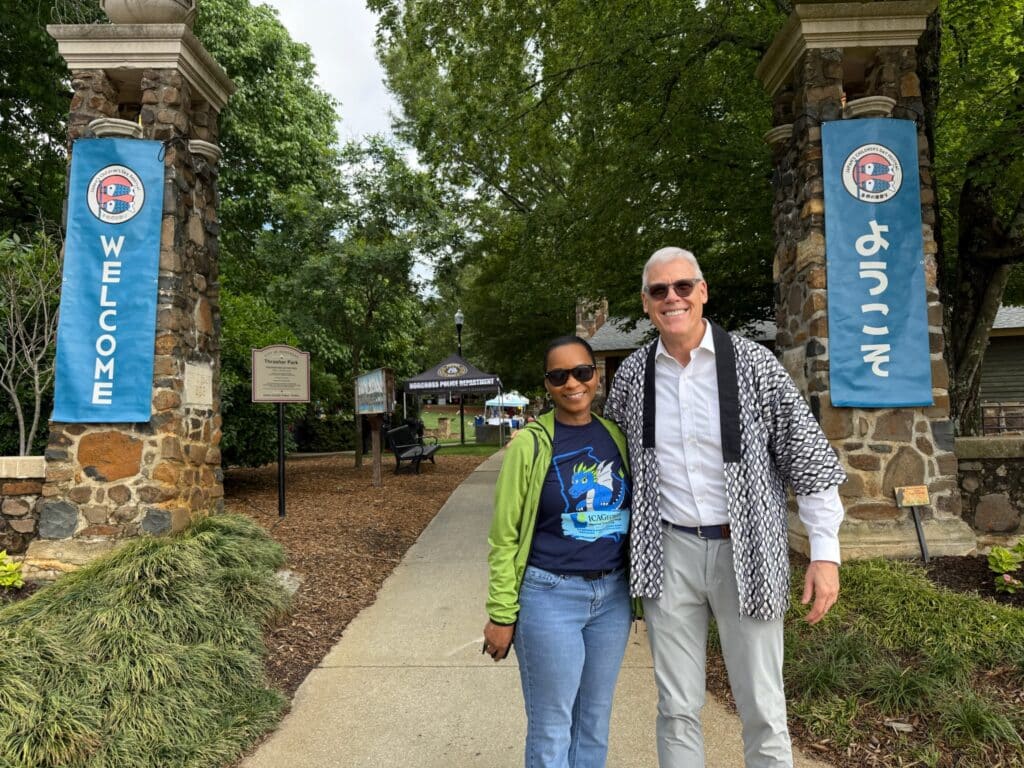
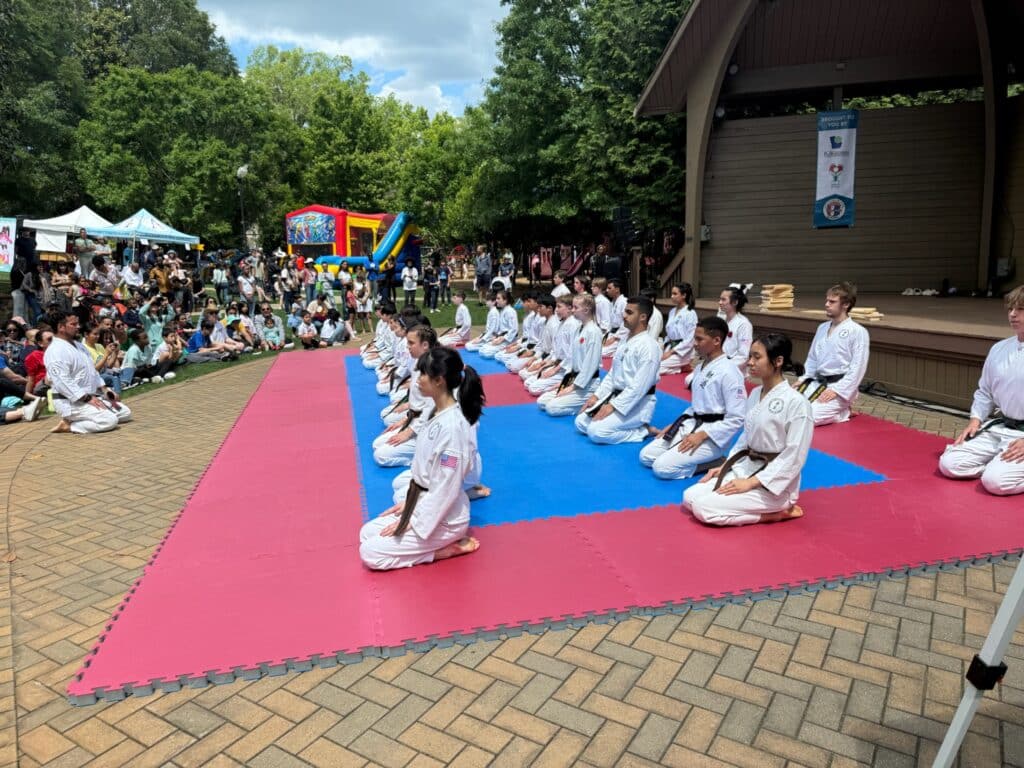


“We’re deeply grateful to all our sponsors, performers, volunteers and families who made the day so special,” said Jeremy Williams, president of the ICAGeorgia PTO.
As Norcross continues to grow as a hub for diverse cultural events, Japan’s Children’s Day Festival stands out as a joyful, family-focused experience with the goal of continuing for years to come.
Follow Japan’s Children’s Day Festival (@JapansChildrensDayFestival) on Instagram and Facebook, and stay tuned for next year’s exciting event.
About ICAGeorgia
The International Charter Academy of Georgia is a statewide charter school available free of charge to any K–6 student residing in Georgia.
Located in Peachtree Corners, the school offers a dual language immersion program in both English and Japanese, a rigorous standards-based curriculum, extracurricular activities and multiple opportunities throughout the year to engage in cross-cultural community.
For more about the school, visit internationalcharteracademy.org.
Related
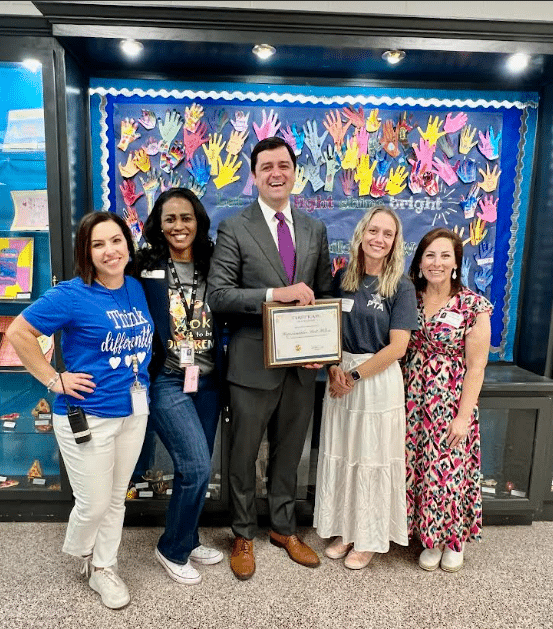
Simpson Elementary School celebrated Exceptional Children’s Week (ECW) last month with five days of special activities to recognize their special needs population and all of their exceptional students.
April 14–18 is set aside each year to celebrate children with disabilities, gifts and talents. This year’s ECW theme was Bridging Gaps and Building Futures, and the school was happy to take part.
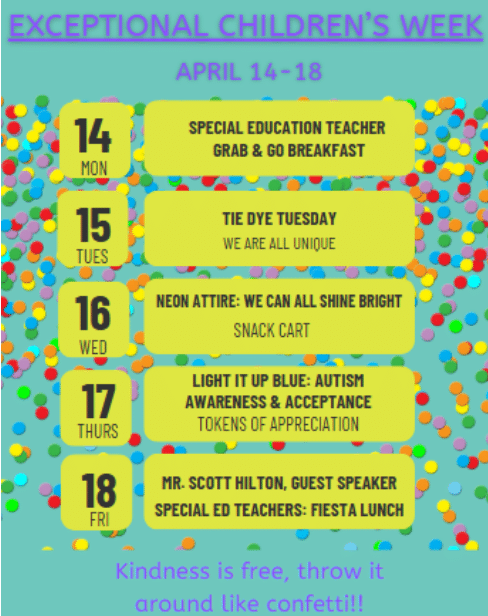

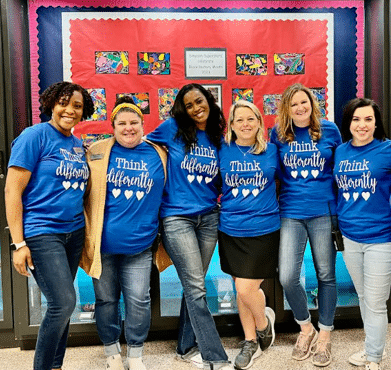

They highlighted each day of the week on the morning news with fun facts about notable people in society — and throughout history — who have overcome challenges with their disabilities, including actor Daniel Radcliffe (who has lived with dyspraxia for his entire life), Tom Cruise, Whoopi Goldberg, Frida Kahlo and Helen Keller.
Simpson Elementary’s technology team also pre-recorded various special needs classes reciting the Pledge of Allegiance every day of the week.
Guest speaker
To end their ECW with a bang, they invited former Simpson Elementary parent, State Representative Scott Hilton, to come in and speak to their K-2 classes about raising his son, Chase (who is autistic and now a student at Norcross High School), and how being different is okay.
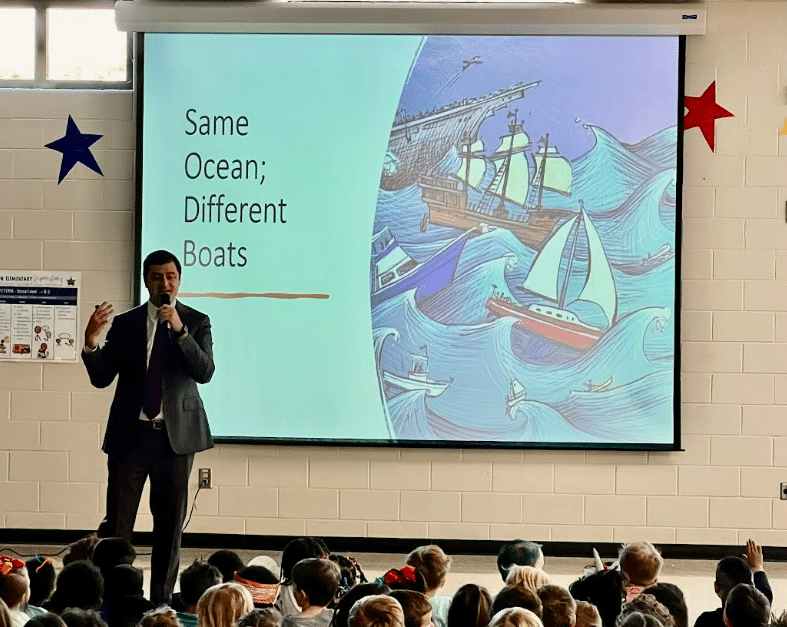

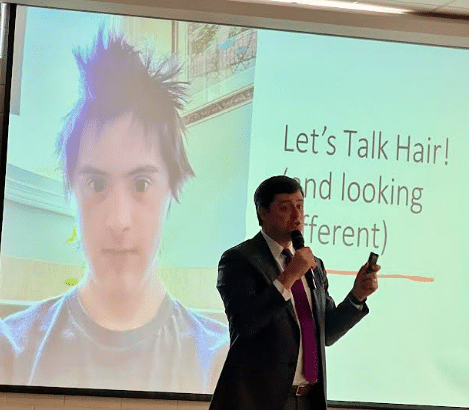
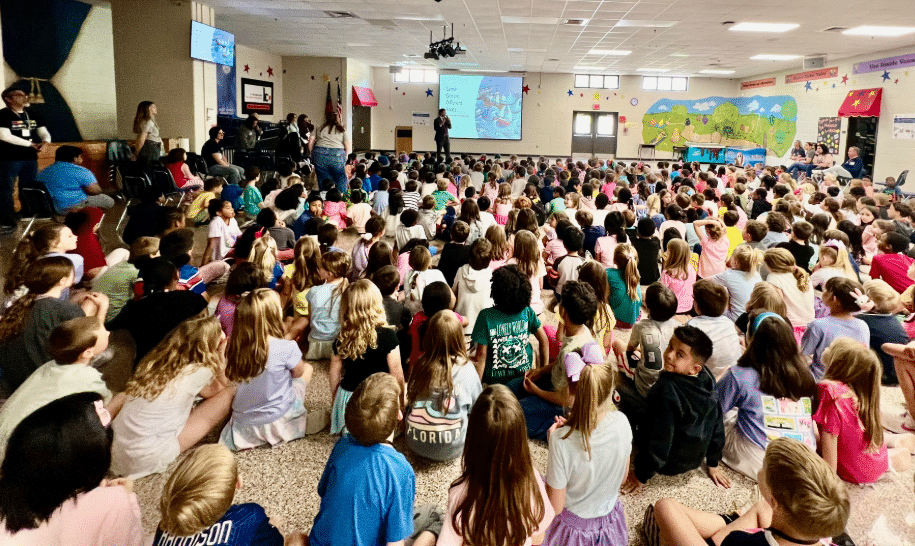
“Showing kindness and being inclusive is the best version of humanity,” said Dr. Taffeta Connery, Simpson Elementary School principal, in a statement about the event.
“Simpson Elementary has a special needs population of 214 (23%) of 946 students. [And] … we strive to ensure that our students are valued, recognized and instilled with high expectations for all.”
For more about Simpson Elementary, visit simpsones.gcpsk12.org.
Related
Education
Paul Duke STEM High School Student Earns CGO Scholarship
Published
4 weeks agoon
May 2, 2025
Cobb Global Outreach Inc. (CGO Inc.), a non-profit organization dedicated to enhancing financial literacy and educational opportunities, recently awarded three scholarships to metro Atlanta high school seniors, including one to Paul Duke STEM student, Baylor M. Brown.
The scholarship initiative underscores CGO Inc.’s commitment to empowering youth through financial education and support.
According to CGO’s social media pages, these outstanding students have shown incredible dedication and resilience in their academic journeys. “We are proud to support their continued success and look forward to seeing all that they will achieve!”
Scholarship details and impact
The scholarships provided by CGO Inc. are designed to alleviate financial barriers and encourage academic excellence among students pursuing higher education. Each scholarship recipient will receive financial assistance to support their educational endeavors, along with resources to enhance their understanding of financial management and literacy.
The scholarship recipients have demonstrated remarkable potential and a strong commitment to making a positive impact in their local community and beyond.
Bobby Cobb, CEO and founder of Cobb Global Outreach Inc., expressed enthusiasm about the partnership, stating, “We are honored to support the students … . By investing in their education and financial literacy, we aim to equip them with the skills necessary for a successful and financially secure future.”
Looking ahead
Cobb Global Outreach Inc. remains committed to expanding its scholarship programs and financial literacy initiatives. The organization plans to collaborate with additional schools and community partners to further its mission of closing the wealth gap and fostering economic empowerment among youth.
About Cobb Global Outreach Inc.
Founded in January 2021, Cobb Global Outreach Inc. is dedicated to educating middle and high school students about financial literacy. The organization believes that providing students with tools and resources related to financial literacy will help narrow the wealth gap and promote economic empowerment.
For more information, visit cobbglobaloutreachinc.com.
Related
Read the Digital Edition
Subscribe
Keep Up With Peachtree Corners News
Join our mailing list to receive the latest news and updates from our team.
You have Successfully Subscribed!

From Boardrooms to the Himalayas: Vandana’s Journey to Purpose and Growing with Intention [Podcast]

Guardians of the Jukebox to Play the VoxStage on May 31

Music Matters Productions Expands Peachtree Corners Headquarters

Brandon Branham Honored for Transformative Leadership in Peachtree Corners

“Geek Culture” Shines at 2025 MomoCon

Celebration and Community: ICAGeorgia Wraps Up School Year with Two Festive Events

Vox-Pop-Uli Launches RED Initiative for Veterans’ Support

The PCBA Awards $500 to Light Up The Corners at After-Hours Event

Vox-Pop-Uli Launches RED Initiative for Veterans’ Support

The PCBA Awards $500 to Light Up The Corners at After-Hours Event

“Geek Culture” Shines at 2025 MomoCon

Celebration and Community: ICAGeorgia Wraps Up School Year with Two Festive Events

Guardians of the Jukebox to Play the VoxStage on May 31

Music Matters Productions Expands Peachtree Corners Headquarters

Brandon Branham Honored for Transformative Leadership in Peachtree Corners

From Boardrooms to the Himalayas: Vandana’s Journey to Purpose and Growing with Intention [Podcast]

Light up the Corners [Video]

Capitalist Sage: Business Leadership in Your Community [Podcast]

Cliff Bramble: A Culinary Adventure through Italy

Top 10 Brunch Places in Gwinnett County

A Hunger for Hospitality

THE CORNERS EPISODE 3 – BLAXICAN PART 1

Top 10 Indoor Things To Do This Winter

The ED Hour: What it takes to Remove Barriers from Education



